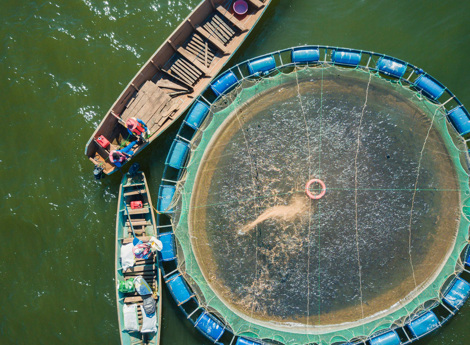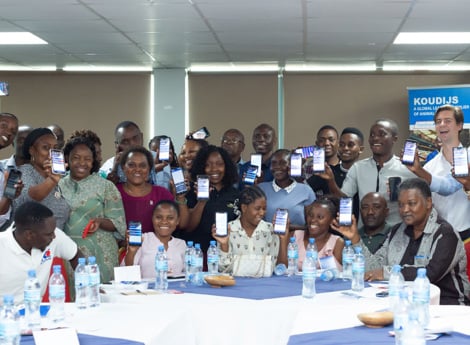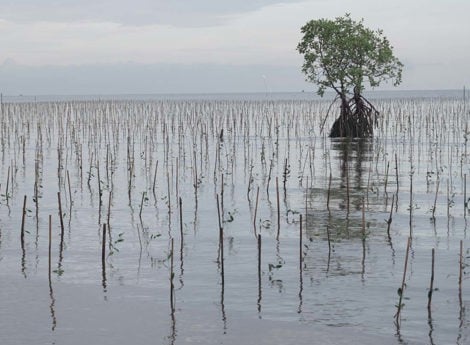A De Heus hatchery in Ghana boosts the region's farmers and supports local communities
Last year, De Heus formed a pioneering joint venture with Kuipers Breeders to set up a state-of-the-art hatchery in Ghana producing layer chicks. By supplying a cost-effective alternative to imported layer hens, the partnership aims to help develop egg farming in the region, provide the local population with an affordable source of protein and support rural communities. Theo Smalbraak, Business Group Director Africa & Middle East, De Heus, and Jurjën Kuipers of Kuipers Breeders report on the status of project.

Maximum capacity
"We now have three layer houses in operation with about 64,000 Lohmann Brown and Lohmann LSL parent stock plus rearing," says Jurjën. "We supply hundreds of farmers in Ghana as well as farmers and distributors from Togo, Burkina Faso and Ivory Coast." Some of these customers drive for as long as 25 hours to buy layer chicks from the partnership. "We're at maximum capacity and selling everything we produce," says Theo. "And the fact that we're selling across borders says a lot. Even with high transportation costs, we're still competitive in those markets."
Quality is essential
Before the hatchery opened, egg farmers in Ghana were dependent on imported day-old layers which are expensive and often of poor quality. Layer chicks from Kuipers Breeders are much better in quality and about 30% cheaper than imported chicks, which is a huge saving for Ghanaian farmers, says Jurjën. "Air freight is never good for day-old chicks. A chick imported from Europe is two or three days old when it arrives in Ghana." The Kuipers-De Heus hatchery transports layer chicks on the day they are born, but first feeds them Koudijs Galdus pre-starter and also vaccinates and debeaks them. "You have to start with a good product," explains Jurjën. "You can give layer chicks the best feed in the world, but if you start with a bad-quality chick you won't get good results. At the same time, if you give a farmer a high-quality day-old chick but don't give it good feed, you will never get good performance. It's important for both the hatchery and the feed company to deliver quality. That's why our joint venture makes a difference."
Learn more about our global sustainability approach
Profitable feed business
Farmers need high-quality feed produced locally to develop a healthy business. That's why the construction of De Heus' compound feed factory in Tema, Ghana, was vital to the viability of the joint venture with Kuipers Breeders. "Our feed factory is doing very well," says Theo. "It's been a hectic couple of years with extremely high inflation in Ghana, but we've still managed to grow our business profitably in both poultry and aquafeed. But it's not just about growing our business, we want to grow the market as well. Together with Hugo Visscher, General Manager, De Heus Ghana, and Moses Aidoo, General Manager, Kuipers Breeders Ghana, we have an intensive collaboration to make this happen. This good collaboration is the basis of our shared success.”
Joint seminars
To support the country's burgeoning egg farming market, Kuipers Breeders and De Heus are the first companies to hold joint seminars to educate and train farmers. In March this year, the partners organised seminars in Dorma, Kumasi and Accra covering various aspects of animal management and welfare including beak treatment, lighting, ventilation, feeding and biosecurity. "There are a lot of new farmers in Ghana, so we welcome anyone regardless of whether they have 90 chicks or 100,000," says Jurjën. "It helps that we're working together with De Heus on these events because if we get questions about day-old chick management or feed strategies we can always answer them." After the success of these seminars, Jurjën and Theo plan to organise further seminars in September and October.
Sharing knowledge
In addition to seminars, the partnership provides other information materials. "Because of the success of our joint venture, we have the resources to print information leaflets," says Jurjën. "We can also employ Ghanaian staff to go out to farms and advise farmers. Kuipers Breeders Ghana also has a Facebook page with lots of tips and information on animal management. "We're putting a lot of knowledge out there on the market," adds Jurjën. "An old gentleman of about 70 came up to me at one of our seminars, took both my hands and said, 'Your companies are a gift to Ghana.'"
Read more about this partnership
Dive into our detailed discussion with Jurjën Kuipers and Theo Smalbraak, to learn more about thiso learn more about this impactful partnership and its ambitious goals for Ghana's agricultural future.
Read the articleHelping farmers grow their business
All these initiatives are aimed at helping farmers grow their business. "We can't really reduce the price of feed which is about 80% of a farmer's costs," says Jurjën. "But what De Heus and Kuipers can do is increase production on farms. That's our goal." In a mature market like the Netherlands, farmers are close to 95% performance from their animals, but in a less developed market like Ghana there's a lot of potential to improve results. "With high-quality chicks, good feed and the right advice, 50 extra eggs per chick per year is possible for many farmers with the same cost," Jurjën explains. "So imagine the impact of 50 more eggs per chick on a farm with 1,000 or even 10,000 chicks. It's a lot of money."
Benefiting the local community
As well as helping farmers improve their business performance, the joint venture also has a positive impact on the local community. When the new hatchery was built, Jurjën and his team had a pipe connected to the facility's water supply to provide the local village with fresh water. They also built a small road which the community can use and which makes the village easily accessible. All this was achieved using local material and labour, and now that the hatchery is fully operational, it employs local people. "The farm is located in Sege and we employ about 100 people from the nearby village," says Jurjën. "They get a healthy, balanced meal every day and health insurance. We also pay good salaries so they can afford to send their children to school." With more money coming into the local economy, people are building houses in the village and there is now a small supermarket. "These may sound like small things, but for the Ghanaians and me, they're huge" says Jurjën.
Learn more about Kuipers Breeders
Further opportunities
Although the hatchery's main output is layer chicks, Jurjën is also exploring other opportunities to compete with expensive imports. "Last year we produced about 400,000 broiler chicks for Christmas and Easter," he explains. "That's not a lot, but this year we hope to produce an extra 300,000. It's a step-by-step process." The partners are also talking about rearing layer chicks for longer. "The first few weeks of a chick's life are critical," says Theo. "So if we rear them for five weeks ourselves or with partner farmers, the birds will be in really good shape. We can further control quality and increase our distribution." For now though, Jurjën and Theo want to consolidate what they have already achieved. "It wasn't easy developing this project, but we've been doing really well for the last five months." says Jurjën. "So let's stabilise what we've got and then look at future plans."














